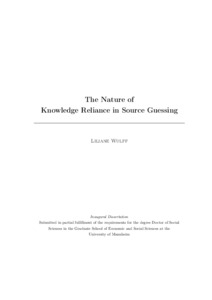|
The nature of knowledge reliance in source guessing
Wulff, Liliane
![[img]](https://madoc.bib.uni-mannheim.de/55333/1.hassmallThumbnailVersion/Dissertation_Thesis_LW.pdf)  Vorschau |
|
PDF
Dissertation_Thesis_LW.pdf
- Veröffentlichte Version
Download (6MB)
|
|
URL:
|
https://madoc.bib.uni-mannheim.de/55333
|
|
URN:
|
urn:nbn:de:bsz:180-madoc-553337
|
|
Dokumenttyp:
|
Dissertation
|
|
Erscheinungsjahr:
|
2020
|
|
Ort der Veröffentlichung:
|
Mannheim
|
|
Hochschule:
|
Universität Mannheim
|
|
Gutachter:
|
Bröder, Arndt
|
|
Datum der mündl. Prüfung:
|
29 Mai 2020
|
|
Sprache der Veröffentlichung:
|
Englisch
|
|
Einrichtung:
|
Außerfakultäre Einrichtungen > GESS - CDSS (SOWI)
Fakultät für Sozialwissenschaften > Kognitive Psychologie mit Schwerp. Kognitives Altern (Kuhlmann 2015-)
|
|
Fachgebiet:
|
150 Psychologie
|
|
Freie Schlagwörter (Englisch):
|
source guessing , source monitoring , stereotypes , multinomial modeling
|
|
Abstract:
|
Context matters for complex human information processing. The ability to attribute information to its origin (source) is not only crucial for daily social interactions (e.g., who told me something?) and impression formation about other people, but it is also essential to judge the credibility of sources and validity of the received information (e.g., where did I read something?). Even more so, failures of source attributions can have far-reaching consequences, for instance in the distribution of fake news in the recent media debate but also in eyewitness testimony where misattributions become even more severe (i.e., sentencing innocent individuals). Retrieving the origin of an episode from memory has been termed source monitoring (cf. M. K. Johnson et al., 1993). Alongside memory processes, source attributions can be based on guessing processes affected by general or contingency knowledge and plausibility or metacognitive beliefs in case a source’s characteristic cannot be retrieved from memory (cf. M. K. Johnson et al., 1993). This thesis specifically focuses on knowledge reliance in source guessing. That is, when people infer the source due to a lack of memory traces, they rely on knowledge acquired prior to or during the learning environment. While mostly memory processes were of prime research interest in the past decades, guessing processes were given less consideration. In this thesis, I address the underlying nature of knowledge reliance in source guessing more thoroughly as part of four manuscripts, thereby contributing to put the so far missing pieces of the source-guessing puzzle into place. In these manuscripts, I examine knowledge reliance in source guessing with regard to its cognitive dynamics, stability, resource dependence, and generalization to novel stimuli to serve the overarching objective of inferring its underlying nature. In the first manuscript, I demonstrate the utility of the process-tracing methodology mouse tracking to unpack the influence of knowledge reliance on source-monitoring processes. In the second manuscript, I quantify the extent to which individual differences in knowledge reliance in source guessing are stable across time and knowledge domains. In the third manuscript, I refine the understanding of the underlying automatic or controlled mechanisms of knowledge reliance. In the fourth manuscript, I expand the scope of knowledge reliance in source guessing to novel information contexts. In sum, this thesis provides new insights into the application of knowledge structures in judgmental processes under source uncertainty.
|
 | Dieser Eintrag ist Teil der Universitätsbibliographie. |
 | Das Dokument wird vom Publikationsserver der Universitätsbibliothek Mannheim bereitgestellt. |
 Suche Autoren in Suche Autoren in
Sie haben einen Fehler gefunden? Teilen Sie uns Ihren Korrekturwunsch bitte hier mit: E-Mail
Actions (login required)
 |
Eintrag anzeigen |
|
|
